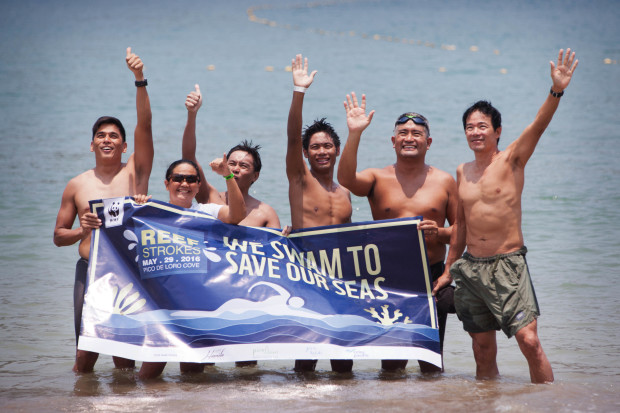Swimmers race to save richest place under the sea

Six open-water athletes swim for the protection of coral reefs and the Verde Island Passage. Photo by WWF Reef Strokes
NASUGBU, Batangas—To drum up awareness of the need to protect “the world’s center of the center of marine shorefish biodiversity,” six Filipino athletes braved strong current and intense heat on May 29 to complete a cove-to-cove swim in the Verde Island Passage between Batangas and Mindoro provinces.
With only seconds to stop and hydrate, the open-water long-distance swimmers took to the sea during “Reef Strokes,” an event organized in time for the commemoration of World Environment Day today, World Oceans’ Day on June 8 and Coral Triangle Day on June 9.
The World Wide Fund for Nature-Philippines (WWF) mounted the event in cooperation with the SEA VIP Institute and with the support of Hamilo Coast Pico de Loro Beach and Country Club, and Cebu Pacific Air.
The Verde Island Passage, impressive for its wall-to-wall coral reef, is home to 74 genera of hard corals and 319 of the world’s marine species, according to Conservation International.
“This is the richest place on earth. We are where the action is,” said biodiversity scientist Dr. Wilfredo Licuanan. But he warned that due to climate change and other factors, “we can lose our corals in a matter of weeks, not years.”
Article continues after this advertisementAs open-water swimmers, “we are natural stewards and ambassadors of marine protection,” Betsy Medalla said.
Article continues after this advertisementIt took her and the other athletes about four hours to complete the “dry land to dry land” marathon that started 7 a.m. at Dorado Cove and ended at Pico Beach.
Four of them hit the 10-kilometer mark: Medalla (10.65 km in 3 hours 12 minutes), Julian Valencia (10.6 km in 3 hours 13 minutes), Moi Tamoyam (10.2 km in 4 hours 51 minutes), and Frank Lacson (10.5 km in 4 hours 15 minutes). Miguel Villanueva completed 9 km (4 hours 53 minutes).
Ingemar Macarine, 39, also known as the “Pinoy Aquaman” and still recovering from an asthma attack, swam 7.1 km in 3 hours 31 minutes.
At one point, the swimmers were “practically not moving” due to strong waves, Valencia said. “Mentally, you want to give up [but you] also want to see it through.”
“We were supposed to enter 14 coves, but the route had to be shortened because of the strong current,” Macarine said.
The records from the Verde Island swim will be submitted to the California-based World Open Water Swimming Association, where, according to Macarine, so far only six Filipinos, including himself and Lacson, had records for completing at least 10 km of marathon swimming.
What should have been a breathtakingly beautiful sight underwater was marred by trash. The swimmers reported seeing plastic bags and even a pair of shoes.
“It was really disheartening to see plastic floating around you,” said Macarine, adding that it was among the dirtiest waters he had swam in.
“Coral reefs give millions of people food and livelihood,” said Joel Palma, WWF-Philippines president. “However, they are threatened by plastic waste, which smothers corals. Climate change effects, such as global warming, also lead to coral bleaching, turning once productive reefs into graveyards coated by algae.”
Palma said the Philippines used to be among the top producers of marine products, but its resources are threatened by pollution and unsustainable coastal tourism and industries. These affect about
1.2 million Filipinos who directly depend on fishing for their livelihood.
Climate change contributes to the rapid degradation of coral reefs, which take thousands of years to grow just a few meters back, Licuanan said.